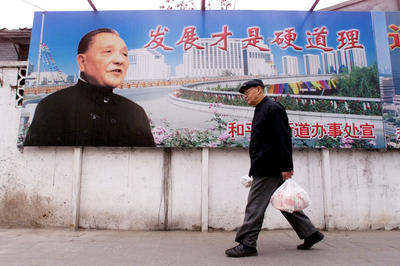Instead, the new General Secretary travelled to Shenzhen, a prosperous special economic zone once overseen by his father. There he laid flowers at a bronze statue of Deng Xiaoping.
Deng’s most notable achievement was to draw a line under the ideological excess of the Cultural Revolution. He shifted China’s focus away from Mao’s predatory internal fixations towards sound governance, and engagement with the international economy. As Xi Jinping writes the next chapter of China’s dream, he must turn the page on domestic tensions caused by Deng’s booming economic legacy in the south. He should also take the measure of a resurgent, often restless nationalism. Deng Xiaoping’s legacy should prove instructive in this regard. He was the first to reconcile the contemporary Chinese story with the dictates of practical government.
When Deng Xiaoping travelled to Paris in the early 1920s, Germany and her overseas possessions were dismembered. Colonialism, social injustice and the erosion of civil authority in Europe must have resonated with the young visiting student. China, even more immense and populous, could never function without the strong central government his leadership came to embody. But while committed to social equality, Deng was no ideologue. After taking power in 1978 he would test the political climate before settling on major policies.
Mao’s puritanism had made way for more pragmatic engagement with the world. Yet despite his own incarceration and denunciation at the height of the Cultural Revolution, Deng could never really condemn Mao’s ideological excess. Every Chinese leader is compelled to work within the strictures of state mythology and the party structure — including Xi Jinping. However, by dismantling the communes and encouraging private enterprise under a centrally planned economy, Deng did create a distinctly Chinese form of socialism.
This also proved a foundation for China’s complex double track — coined as ‘one country, two systems’ — marrying socialism with the rampant capitalism of Hong Kong and Macau. Deng created fourteen special economic zones to ‘welcome foreign investment and advanced techniques’.
Intervening years have seen China’s coastal regions boom, while the yawning hinterland has barely stirred. Xi will need to bridge this chasm between China’s poor interior, and the state-controlled capitalism now in the ascendant along the coast. His ‘Chinese Dream’ seems a more useful allegory in this regard than the old party lines. Communism still matters, because it frames China’s ongoing, egalitarian sense of national identity. But Deng’s gift was to establish a practical, consensual framework for governance that transcended Mao’s ideological zealotry.
Forty years ago, the accusation of capitalist inclinations would be levelled against political enemies. Today, Xi Jinping profits from accusations of corruption against political rivals, notably Bo Xilai. Issues of transparent and effective governance have largely replaced competing ideologies in the political marketplace. This may be because Xi Jinping’s enjoys less capacity for ideological indulgence than his post-war predecessors. Xi has more resources but fewer options than Deng Xiaoping, mainly due to practical constraints on his use of violence.
First, while Deng prosecuted a limited war with impunity against the Vietnamese in 1979, it is hard to imagine Xi enjoying the same strategic flexibility. The cost would be devastating. For the first time in history, Chinese prosperity and social order largely depend on the global economy. This creates a strong vested interest in financial and regional stability, which is yet to be manifest in China’s bullying approach to regional fora and territorial disputes.
Second, Xi Jinping has far less recourse to brutal internal suppression. Deng served in war, and never demonstrated much compunction in killing his own citizenry. But, unlike Mao’s genocidal follies violence was rarely sanctioned on ideological grounds. Instead, the sanctity and central primacy of the state was Deng’s objective, along with the ancillary concentration of personal power.
Xi Jinping will find it more difficult to use force, even to compel the rebottling of nationalist sentiment. He will be frustrated by an increasingly open media and mobile technology. Xi might join Instagram, but remains constrained by party orthodoxy. He cannot bypass the Communist Party to appeal for direct public support over a contentious issue. Nor can he suppress public opinion or popular demonstration, as Deng did in Tiananmen Square. International opprobrium would soon be matched by domestic outrage.
Instead, Xi will prioritise economic development over ideological conviction. His primary goal is to maintain the growth that underpins the party’s popular support, while sustaining the pragmatic reforms instituted during the 1980’s. However the uneven distribution of wealth, and an increasing preponderance of bureaucracy hampers economic reform. By promoting official austerity while encouraging growth, Xi seeks to appease both schools of fiscal thought. He is unlikely to adhere to any single orthodoxy in creating his ‘Chinese Dream’.
China has reached an inflection point. It has probably derived maximum benefit from the existing government structure. Increasing regulation, corruption and internal problems threaten Xi’s capacity to promote reform, while still maintaining some semblance of ideological conviction.
The new President must weigh planned initiatives against a backdrop of serious social problems, military expansion and demands for political participation. Like Deng Xiaoping, he would be advised to find a new road; away from ideology, towards pragmatic, tangible policies to expand prosperity and influence. This is China’s best chance to avoid nursing an absolutist, resentful outlook towards the world. Deng Xiaoping, who watched nationalism engulf China, Europe and the rest of the world in war would agree.
Christopher Johnston is a fellow at the Institute for the Study of Diplomacy, Georgetown University.

